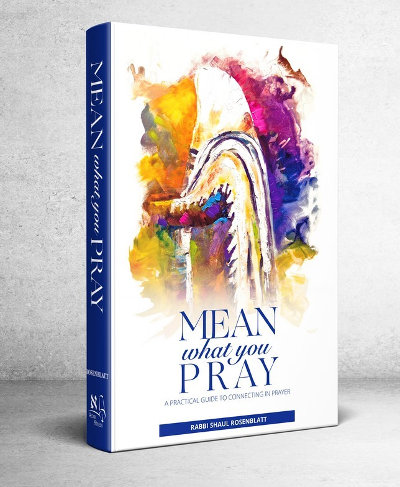 Iran’s Attack on Israel
Iran’s Attack on Israel


6 min read
Exploring the Jewish understanding of prayer.
There is an obvious question regarding prayer: If God is omniscient, then He surely knows what we want. And if he knows what we want, why do we need to ask him for it?
The question is even stronger than that. Not only does God know what we want, He knows what is best for us – what we need. And the two are often not the same. A person may want to win a fortune in the lottery. But how many lottery winners have found that the money has been more a curse than a blessing? They don’t know who their friends are anymore. Their family suddenly has all sorts of financial expectations. Or they start to live way above their means, only to find the money goes quickly and ultimately, they’re left with less than they started with.
What you would prefer: What you think is best for you or what God knows is best for you?
Or someone desperately wants to marry a certain person, but he is infatuated and not seeing straight. If he were to pray to marry her and God were to listen and respond, he would end up in a painful and eventually failed relationship.
Someone once quipped to me, “Be very careful what you pray for because God might just give it to you!” So yes, it’s natural for us to pray for what we want – because what we want looks like what’s best for us. But wouldn’t we be better off leaving that to God? What you would prefer: What you think is best for you or what God knows is best for you?
With this in mind, perhaps the safest prayer should be, “Master of the Universe, You know me better than I know myself. Please give me what I need in life and don’t worry about what I might think I want.” Or even better: “Master of the Universe, You know me better than I know myself. It would be incredibly arrogant of me to ask You for what I want – so I won’t. I recognize that You always have my best interests at heart and I know that You will always do as you see fit. So, I just wanted to say ‘Thank You’ for everything that you do.”
While some may advocate such prayers, it’s not the mainstream Jewish view. Jewish prayer is specific. We ask for what we want, not for what God knows is best. I believe there is a strong philosophical foundation for this.
The Jewish understanding is that God created this world for us to exercise our freewill. He gave us an imperfect world (a very imperfect world, actually) and made us His partners, so to speak, in perfecting it. As such, we are tasked with actively taking responsibility for His world, not simply leaving Him to run it by Himself.
Had he wanted to run the world on His own and according to His will, He would not have needed to create us. Of course, there is a balance to be had between our own efforts and trusting in God, but, wherever that balance might lie, our own efforts are very much a part of what is expected from us in this world. And in order to put in our own efforts, we must have our own opinions about what needs to be done. What is the difference, after all, between asking God that he lets me marry a specific girl and getting down on one knee a proposing to her? Either way, I am having an opinion as to whom I should marry and actively following through on that opinion.
To pray for God to do what He thinks is best is like owning a field and waiting for God to make something grow.
Our job as human beings is to have (humbly, of course) opinions about how to improve our lives and the world in which we live, and to actively work towards implementing those opinions. Part of those active efforts is the medium of prayer. To pray for God to do what He thinks is best is like owning a field and waiting for God to make something grow. Although God controls everything, He set up His world where human beings are active participants responsible for choosing wisely.
With this understanding, prayer is a very significant element of our role in this world. We are here to look at God’s world and ask ourselves how we can make it better. We are to undertake to do so – and to do it with God at our side.
It is a delicate balance that we must navigate and prayer is one of our greatest friends. As we engage in our world and change it, prayer keeps us humble. When we achieve, it reminds us from where that achievement comes.
It also places us before God as we reflect on what matters to us. Our priorities are very different when we stand before God than when we live our busy lives without noticing Him. Prayer keeps us rooted to the spiritual, even as we go out and engage fully with the material world.
Prayer is a quiet space in our busy lives – a place where we touch something deeper, something more powerful, something that is more our true nature. Prayer is an anchor. And praying for what makes sense to us is our job.
Through prayer, we engage in the holiest and exalted of all endeavours – partnering with God to create that perfect world that He had in mind from the very beginning of His Creation.
 Based on Rabbi Rosenblatt’s new book, Mean What You Pray: A Practical Guide to Connecting in Prayer. Does Prayer elevate your soul, or leave you feeling frustrated and even empty? Prayer is both a science and an art, and is not something that necessarily comes naturally. Mean What You Pray is a book for those who believe in the power of prayer and want to learn how to leverage it more effectively.
Based on Rabbi Rosenblatt’s new book, Mean What You Pray: A Practical Guide to Connecting in Prayer. Does Prayer elevate your soul, or leave you feeling frustrated and even empty? Prayer is both a science and an art, and is not something that necessarily comes naturally. Mean What You Pray is a book for those who believe in the power of prayer and want to learn how to leverage it more effectively.
Featured Image: Unsplash.com, Denys Nevozhai

This article started off very strong, with very strong logic, and then veered into just belief according what is claimed to be Jewish, but that is not the truth. There were enormous Tzaddikim, who would say Tehillim, and it is said "God offered them the world" and the Tzaddik would not make any changes because God is GOD and Knows what's best. --- The logic was very strong at the beginning and then it just veered into some kind of tribal belief system not based on sechel or logic, but just on "tradition" which is not in fact tradition. The prayers were instituted because of the fear that most people couldn't articulate eloquent prayers. There were many huge Tzaddikim that didn't even pray for _30 days_. Did Moses simply pray for what he wanted or did he try to do the will of GOD?
"Thy Kingdom Come, Thy will be done on earth as it is in Heaven."